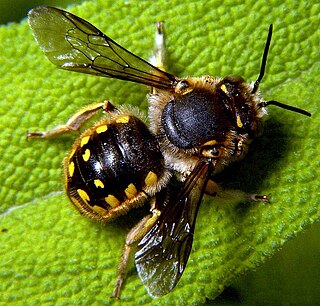
Megachilidae is a cosmopolitan family of mostly solitary bees. Characteristic traits of this family are the restriction of their pollen-carrying structure to the ventral surface of the abdomen, and their typically elongated labrum. Megachilid genera are most commonly known as mason bees and leafcutter bees, reflecting the materials from which they build their nest cells ; a few collect plant or animal hairs and fibers, and are called carder bees, while others use plant resins in nest construction and are correspondingly called resin bees. All species feed on nectar and pollen, but a few are kleptoparasites, feeding on pollen collected by other megachilid bees. Parasitic species do not possess scopae. The motion of Megachilidae in the reproductive structures of flowers is energetic and swimming-like; this agitation releases large amounts of pollen.

Jorge Lanata is an Argentine journalist and author. He founded the newspaper Página 12. He hosts Lanata sin filtro on Radio Mitre and Periodismo para todos on El Trece. He writes a column in Clarín.
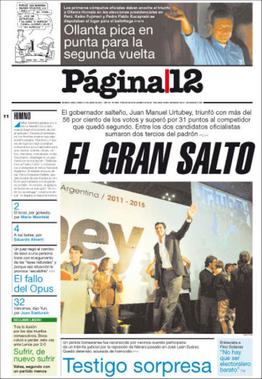
Página 12 is a newspaper published in Buenos Aires, Argentina. It was founded on 25 May 1987 by journalist Jorge Lanata and writers Osvaldo Soriano and Alberto Elizalde Leal.

Lanaria is a monotypic genus of flowering plants containing a single species, Lanaria lanata, endemic to the southern coast of South Africa where it is associated with the fynbos belt. Lanaria lanata is commonly known as Cape edelweiss or lambtails. The genus is placed in the monotypic family Lanariaceae, a family only recently recognized by taxonomists. The APG IV system of 2016 does recognize this family.

Banksia lanata is a species of shrub that is endemic to a restricted area of Western Australia. It has linear leaves, pale cream-coloured flowers in a head with whitish bracts at the base and later up to fifty elliptical follicles in each head.

Digitalis lanata, vernacularly often called woolly foxglove or Grecian foxglove, is a species of foxglove, a flowering plant in the plantain family Plantaginaceae. It gets its name due to the woolly indumentum of the leaves. D. lanata, like other foxglove species, is toxic in all parts of the plant. Symptoms of digitalis poisoning include nausea, vomiting, severe headache, dilated pupils, problems with eyesight, and convulsions at the worst level of toxicity. The plant is also harmful to other animals.
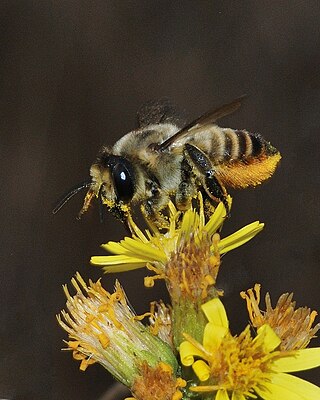
The genus Megachile is a cosmopolitan group of solitary bees, often called leafcutter bees or leafcutting bees; it also includes the called resin bees and mortar bees. While other genera within the family Megachilidae may chew leaves or petals into fragments to build their nests, certain species within Megachile neatly cut pieces of leaves or petals, hence their common name. This is one of the largest genera of bees, with more than 1500 species in over 50 subgenera. The alfalfa leafcutter bee is managed on a commercial scale for crop pollination, and has been introduced by humans to various regions around the world.

Deportivo Anzoátegui Sport Club was a professional football club based in Puerto La Cruz, Anzoátegui. Founded in 2002, the club earned its promotion to the Venezuelan 1st division in 2007. They won the Copa de Venezuela in 2008, and were dissolved in 2019.

Aerva lanata, the mountain knotgrass, is a woody, prostrate or succulent, perennial herb in the family Amaranthaceae, native to Asia, Africa. It has been included as occurring in Australia by the US government, but it is not recognised as occurring in Australia by any Australian state herbarium. The plant sometimes flowers in the first year.

Salix lanata, the woolly willow, is a subarctic species of willow native to Iceland, the Faeroe Islands and Finland, through to eastern Siberia. In Scotland it can be found in only a few localities of Perthshire, Angus and Aberdeenshire, generally on rocky mountain sides at altitudes of 600–900 m (1,969–2,953 ft).

Krascheninnikovia lanata is a species of flowering plant in the family Amaranthaceae, known by the common name winterfat. It is native to much of western North America: from central Western Canada; through the Western United States; to northern Mexico.

Periodismo para todos is an Argentine investigative journalism television program. It is hosted by the journalist Jorge Lanata, and airs on Sunday nights in eltrece. It was highly critical during the Cristina Fernández de Kirchner presidency. In 2013, it won several Martín Fierro Awards including best news TV program and best journalistic work for Jorge Lanata. During Fernández de Kirchner's presidency, it was censored in several provinces of Argentina with governors aligned with the president: Tucumán, Formosa Mendoza and Río Negro.

The K money trail was a 2013 journalistic investigation into political corruption in Argentina. It began with reports on the Periodismo para todos television program hosted by journalist Jorge Lanata. The investigation was named "the K money trail" to imply that former presidents Néstor Kirchner and Cristina Fernández de Kirchner were involved. The investigation showed embezzlement had taken place and suggested the money trail involved Néstor Kirchner, Cristina Fernández de Kirchner and an alleged partner, businessman Lázaro Báez. The journalists concluded that Báez diverted money intended for public infrastructure to tax havens. The television show led to an official investigation. In April 2016, Lázaro Baez was arrested for corruption charges and jailed in the Ezeiza Federal Prison Complex awaiting trial. In mid-2020 he was transferred to house arrest as the proceedings were put on hold due to the COVID-19 pandemic. In 2021, Báez was sentenced to 12 years in prison for money laundering. In June 2023, a separate case looking into possible wrongdoing by Cristina Kirchner was dismissed after the prosecution failed to produce evidence.

Megachile campanulae, known as the bellflower resin bee, is a species of bee in the family Megachilidae. Described in 1903, these solitary bees are native to eastern North America. Studies in 2013 placed them among the first insect species to use synthetic materials for making nests. They are considered mason bees, which is a common descriptor of bees in several families, including Megachilidae. Within the genus Megachile, frequently also referred to as leafcutter bees, M. campanulae is a member of the subgenus Chelostomoides, which do not construct nests from cut leaves, but rather from plant resins and other materials. Females lay eggs in nests constructed with individual cell compartments for each egg. Once hatched, the eggs progress through larval stages and subsequently will overwinter as pupae. The bees are susceptible to parasitism from several other bee species, which act as brood parasites. They are medium-sized bees and the female adults are typically larger than the males. They are important pollinators of numerous native plant species throughout their range.
Megachile venusta is a species of bee in the family Megachilidae. It was described by Smith in 1853.
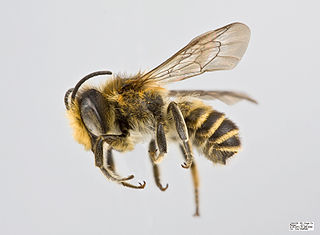
Megachile centuncularis, commonly known as the patchwork leafcutter bee, is a species of bee in the family Megachilidae. It was first described by the Swedish naturalist Carl Linnaeus in 1758.
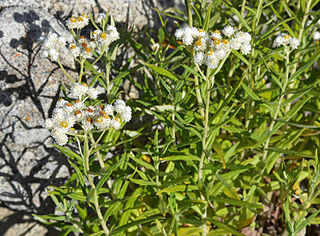
Antennaria lanata is a North American species of flowering plant in the family Asteraceae, known by the common name woolly pussytoes. It is native to western Canada and the northwestern United States.

Dicksonia lanata is a fern endemic to New Zealand. Colloquial names include stumpy tree fern, tūākura and tūōkura.

Daniel Ermindo Lanata is an Argentine football manager.


















